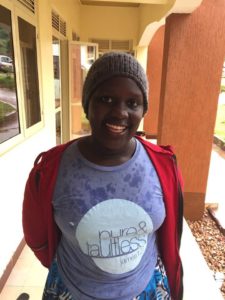 You may or may not know I am in Uganda outside of the capital, Kampala, working on a book. I am staying at the organization Pure & Faultless founded by Sanyu Moreen a 34-year-old Ugandan social worker who learned the hard way to trust in God’s grace. The founder of Pure & Faultless experienced first hand how not having options can feel. When she found herself pregnant and left at the church with no place to turn but God. Moreen, a devout Christian, prayed the age-old prayer; Why have you forsaken me? What shall I do? The answer came, in a dream, God spoke to her saying “you are pure and faultless continue doing what you are doing.”
You may or may not know I am in Uganda outside of the capital, Kampala, working on a book. I am staying at the organization Pure & Faultless founded by Sanyu Moreen a 34-year-old Ugandan social worker who learned the hard way to trust in God’s grace. The founder of Pure & Faultless experienced first hand how not having options can feel. When she found herself pregnant and left at the church with no place to turn but God. Moreen, a devout Christian, prayed the age-old prayer; Why have you forsaken me? What shall I do? The answer came, in a dream, God spoke to her saying “you are pure and faultless continue doing what you are doing.”
From her dream, Moreen came to believe her mission is to help and at-risk girls escape from life in the slums and the sex trade. She gave up pursuing a master’s degree in the United States and set about creating the Pure & Faultless Foundation with friends from the U.S. Three years ago the foundation bought land outside of the Kampala suburb of Kasinge where Rahab’s Corner is situated. I am here to write the girls stories in a book. Telling your story over and over is one of the major healing themes Wangria Jumah (chairman and pastor of RC) employees in his work with the girls based on the book entitled By His Wounds Trauma Healing for Africa by Steven and Celestia Tracey.
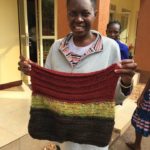 Grace, one of the girls here, engendered an ongoing conversation between Moreen and me and Jumah and me. Not that Grace was the only one, she happened to be the one that set off the alarm bells for me. Weren’t these girls rescued from the sex trade in the slums? If so why is it, only two of them admit to having anything to do with sex for money or survival?
Grace, one of the girls here, engendered an ongoing conversation between Moreen and me and Jumah and me. Not that Grace was the only one, she happened to be the one that set off the alarm bells for me. Weren’t these girls rescued from the sex trade in the slums? If so why is it, only two of them admit to having anything to do with sex for money or survival?
What should I write? As a routine, Moreen gives me backstory on most of the girls particularly if I am not getting enough information from an interview. Interviews, when both parties don’t speak the same language, are difficult for a number of reasons. Things literally get lost in translation. Translators have a way of inferring their own bias on the interpretation not to mention editing for brevity. I discovered the later when a minute of Luganda narrative translated into a brief sentence or two of English. “Is that all she said?” I asked. To my horror my translator said no she said a lot of things about how she felt. I didn’t think you wanted to know. UGH!
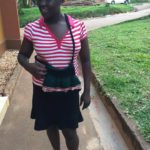 When I asked Aunt Moreen what to do when I know I’m not getting the whole story, should I write the history as it is given or should I augment it with what you have told me? She said, “Write the truth. They aren’t going to admit they were prostitutes.” I rewrote a few narratives adding the details Moreen had shared with me but felt somehow like I was being dishonest.
When I asked Aunt Moreen what to do when I know I’m not getting the whole story, should I write the history as it is given or should I augment it with what you have told me? She said, “Write the truth. They aren’t going to admit they were prostitutes.” I rewrote a few narratives adding the details Moreen had shared with me but felt somehow like I was being dishonest.
The power of story is remarkable in helping to heal trauma. Pure & Faultless at Rahab’s Corner hammers home the need to tell your story to facilitate your healing. Leaving out a piece indicates the omission still has a big charge of shame attached to it. Over my own life, time and again I have returned to tell an aspect of my history to find peace with it.
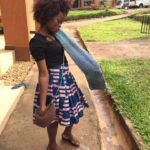 Over the past few weeks as I listen to these heart-wrenching narratives, I am impressed with the sanctity of telling a life’s most private suffering and how the gift of the telling demands to be treated with integrity. I enter into a tacit agreement each time I interview a girl to treat her life with dignity and respect. I can’t just add details because I know them. I took my dilemma to Uncle Jumah (Uncle a sign or respect as is Aunt) to ask his advice. He thought about it for a good while before saying he would like the admission to come from the girls, not me. He said he would again talk to them about the importance of admitting to the truth of their past in getting over the trauma of the wrongs done to them.
Over the past few weeks as I listen to these heart-wrenching narratives, I am impressed with the sanctity of telling a life’s most private suffering and how the gift of the telling demands to be treated with integrity. I enter into a tacit agreement each time I interview a girl to treat her life with dignity and respect. I can’t just add details because I know them. I took my dilemma to Uncle Jumah (Uncle a sign or respect as is Aunt) to ask his advice. He thought about it for a good while before saying he would like the admission to come from the girls, not me. He said he would again talk to them about the importance of admitting to the truth of their past in getting over the trauma of the wrongs done to them.
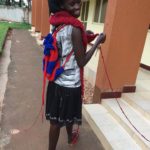 Later on the same rainy cold, evening Grace flounced up to me to show off her knitting progress. I asked her if she would talk again with me and this time tell me the parts of her history she left out. Not because I want to hear the salacious details, I want to help her get beyond the shame of her past and soar. At first, she denied she had held anything back then she hides her face in her hands as if ashamed then peeked out at me and said, “Yes, she would.” We talked for almost two hours that evening with Peace the RC social worker translating. While she shared many details she had not shared before she never admitted to having sex for money even when asked point blank.
Later on the same rainy cold, evening Grace flounced up to me to show off her knitting progress. I asked her if she would talk again with me and this time tell me the parts of her history she left out. Not because I want to hear the salacious details, I want to help her get beyond the shame of her past and soar. At first, she denied she had held anything back then she hides her face in her hands as if ashamed then peeked out at me and said, “Yes, she would.” We talked for almost two hours that evening with Peace the RC social worker translating. While she shared many details she had not shared before she never admitted to having sex for money even when asked point blank.
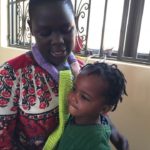 I’m not going to force the issue. Jumah says the biggest deterrent to girls sharing their histories is Uganda is a shame-based culture. No one wants to admit to such things to a world based in shame. Is there a culture anywhere in the world that isn’t shame-based? Is there any place on this planet that doesn’t judge women by their sexual misdeeds such as they are. When the choice is life or starvation and the only thing of any value is your body where is the shame in choosing life? I wonder.
I’m not going to force the issue. Jumah says the biggest deterrent to girls sharing their histories is Uganda is a shame-based culture. No one wants to admit to such things to a world based in shame. Is there a culture anywhere in the world that isn’t shame-based? Is there any place on this planet that doesn’t judge women by their sexual misdeeds such as they are. When the choice is life or starvation and the only thing of any value is your body where is the shame in choosing life? I wonder.
This problem as old as mankind itself leaves girl children, worldwide, with few options and no choice. The untenable situation is foisted on them by the avarice and greed of corrupt governments and an uncaring world. And typical in the patriarchy of our collective society the girls are the ones that carry the guilt and shame as men remorselessly defile them. When will it stop?


